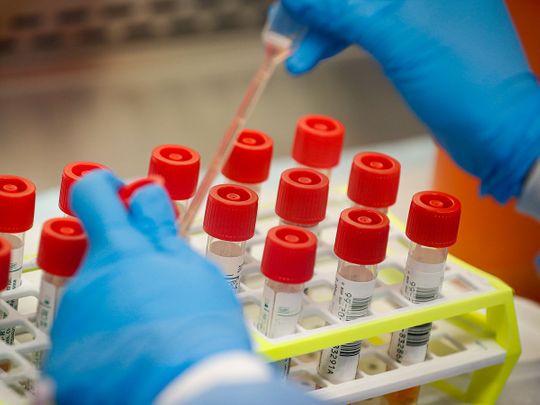
Dubai: UAE residents returning from India must undergo real-time reverse transcription polymerase chain reaction (RT-PCR) COVID-19 test on arrival at UAE airports, Gulf News can reveal.
This is in addition to the pre-depature requirement of RT-PCR COVID-19 negative result from government-approved labs in India, airlines have confirmed.
RT-PCR negative result for COVID-19 not older than 96 hours prior to the departure is a must for all passengers returning to the UAE from India.
The UAE Ambassador to India Dr. Ahmad Abdul Rahman Al Banna had clarified that the UAE will accept COVID-19 negative certificates issued by laboratories doing RT-PCR tests authorised by the Indian government for allowing entry to expats returning from India.
However, as special flights began operating from India to the UAE on Sunday, it emerged that passengers flying in to Dubai, Sharjah and Abu Dhabi airports have to undergo RT-PCR test once again after landing.
Airports in all the three emirates have made PCR test mandatory, according to travel updates issued by airlines.
Home quarantine till negative result
“When you arrive in Dubai, you must take a PCR test at the airport and remain in your residence until you receive the test result. If the test result is positive, you will be required to undergo isolation and follow the Dubai Health Authority guidelines,” Air India Express said in a blog with travel updates for passengers from India.
While PCR testing is undertaken on arrival in Sharjah, PCR test and temperature screening are in operation at Abu Dhabi airport, it added.
Abu Dhabi’s national-carrier Etihad Airways also confirmed this.
“PCR testing and temperature screening are in operation at Abu Dhabi airport, and you’ll be asked to wait two metres apart from other guests at all queuing points,” the airline said on its website.
“When you arrive in Abu Dhabi, you are permitted to travel without restriction to any other emirate, though you must self-isolate for 14 days,” it added.
Passengers, who arrived from India on Sunday, confirmed to Gulf News that they had to provide nasal samples for RT-PCR test for coronavirus.
Mohammed Mohafis, who arrived from Kochi in Kerala to Dubai on an Emirates flight, said the passengers were told that the test results would be intimated to them later.
“Until then, we have to be in home quarantine. We were told that we can move around only if the result is negative.”
He said passengers had to submit their contact number and email ID for receiving the report.
Request to waive pre-departure test
Gulf News had earlier reported that several Indian expats were facing various difficulties in getting RT-PCR tests done in time for their special flights that will fly in UAE residents from India to the UAE from July 12 to 26.
Dr. Nita Salam, one of the founders of a social media group of Indian mothers campaigning for the return of their children stranded in India, said the UAE authorities have been requested to waive the condition of pre-departure tests from India.
“It is clearly mentioned by the Dubai Health Authority that testing on arrival is allowed in Dubai. Since, pre-departure testing causes a lot of challenges, we have written to the UAE authorities to waive it,” she told Gulf News.
Prior to boarding the flight on Sunday, Mohafis said, officials in India had informed passengers that only those carrying RT-PCR COVID-19 negative result from a government-approved lab would be allowed to check-in.
Passengers said those who carried results from labs that are not approved by the Indian Council of Medical Research (ICMR) were turned away at Indian airports.
According to ICMR there are currently 1,132 labs in India testing for COVID-19. Of these 603 laboratories are doing RT-PCR for COVID-19. As many as 373 of these are government hospitals and the rest are private facilities.








